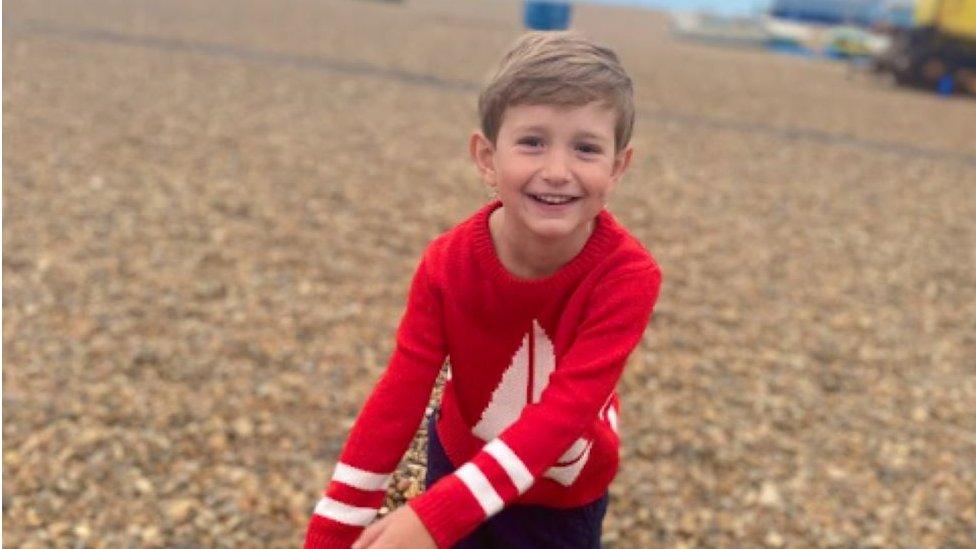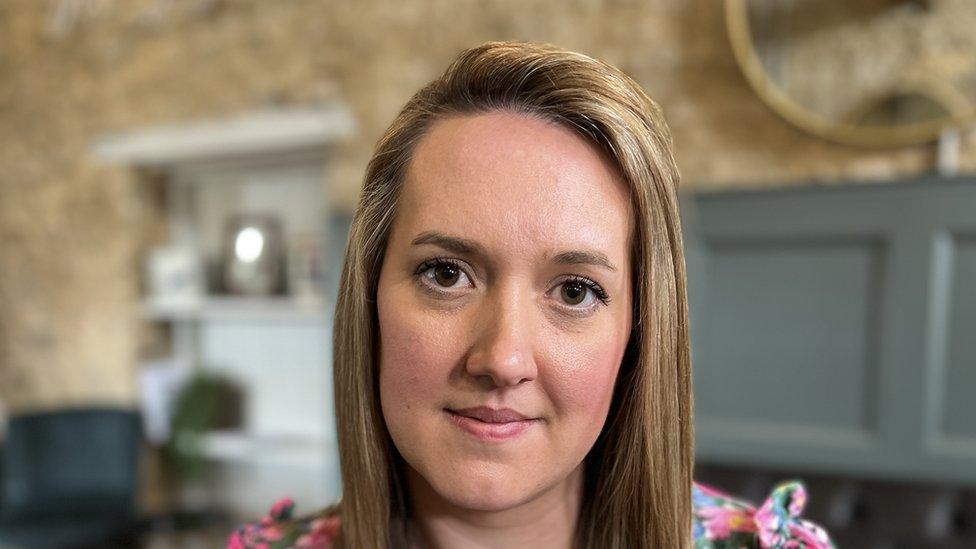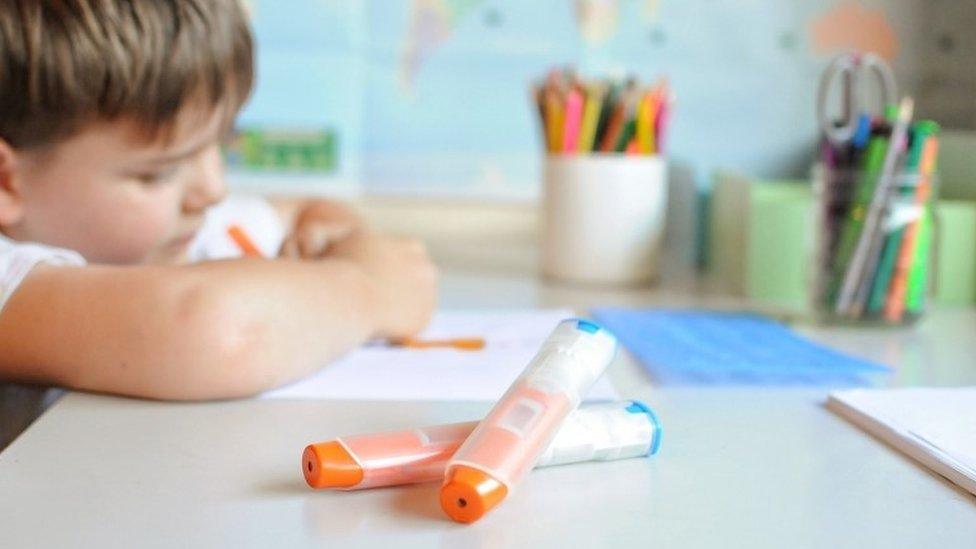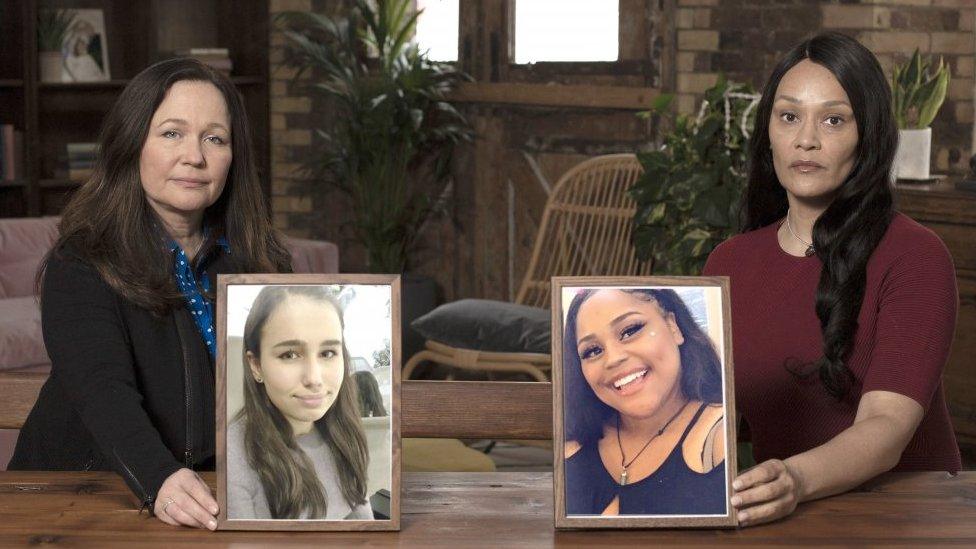School allergy management failings found by study
- Published

Benedict Blythe collapsed at a school near Peterborough in 2021 and the cause of his anaphylaxis is unknown
The mother of a boy who died after having an allergic reaction at school has called for changes to the law.
Five-year-old Benedict Blythe collapsed at a school near Peterborough in 2021 and the cause of his anaphylaxis is unknown.
His mother set up the Benedict Blythe Foundation, which has found failings in how schools manage allergies.
The Department for Education said children with allergies should be supported at school.

Helen Blythe says the report showed a "systemic failing" in safe allergy provision in schools
Helen Blythe, 37, stressed there was currently no evidence of failings at Benedict's former school, but said his death had prompted her to take more interest in the management of allergies in educational settings.
She said: "He was the loveliest boy, he was incredibly kind.. and very bright."
Being the parent of a child with a severe allergy meant being "constantly vigilant", she said.
The research, carried out in partnership with The Institute of Clever Stuff, found a "postcode lottery" in terms of English schools adopting suggested safeguards, she said.

Ms Blythe said her son loved maths and learning
Almost half of the 2,198 schools analysed did not have life-saving medication on site and about a quarter did not provide training on allergy symptoms and what to do in an emergency.
Ms Blythe said: "Unfortunately, this report highlights a systemic failing in safe allergy provision for pupils with allergies."
She said she would like schools to adopt four safeguarding areas; having an allergy policy, individual healthcare plans, medication on site and training for staff.
"About 70% of the schools didn't have [these] four basic safeguards for protecting pupils with allergies in place. It's a shockingly high number that puts children needlessly at risk," she said.
There are no mandatory policies to which schools must adhere - something Ms Blythe would like to see changed.

Tom (right) said he was glad to be home-schooled
Tom, 13, from Essex, is now educated at home amid concerns his school was not always managing his severe allergies safely.
He said: "I was increasingly anxious being in school with my allergies.
"The teachers didn't really know about them and would shout at me saying I couldn't do stuff like sit on the ground. That made me feel upset.
"I wasn't allowed at school dinner and sometimes other children brought in nuts in their packed lunches and ate them near me which was really scary."
He said he didn't feel teachers cared for him properly and that he "definitely feels safer at home".
His mum, Alison, said when he moved to a larger junior school there was a "catalogue of repeated errors which caused severe concern his anaphylaxis wasn't being managed safely".
"Anaphylaxis care seems to be subjective [as to] who is dealing with it rather than having a consensus in school about anaphylaxis policy."

Michael Dove said there had been an increase in allergies and intolerances among pupils in the schools he catered for
Michael Dove, the catering operations manager at Thomas Deacon Education Trust, which runs seven schools across Peterborough and Huntingdon says funding from central government would help schools manage allergies.
"We are finding it more challenging at the moment because we are finding we are having a lot of children with a lot of allergies, which is vastly increased.
"Most schools should be doing voluntary things but I think government should be able to give more support to the schools to highlight these issues," he said.
A Department for Education spokesperson said: "We understand the seriousness of severe allergies and we are clear that children with medical conditions should be properly supported to enjoy a full education and be safe at school. "All schools are required to make arrangements that ensure this is the case."

Follow East of England news on Facebook, external, Instagram, external and X, external. Got a story? Email eastofenglandnews@bbc.co.uk, external or WhatsApp 0800 169 1830
Related topics
- Published25 January 2024

- Published6 October 2023

- Published28 July 2023

- Published15 May 2023

- Published15 November 2019
